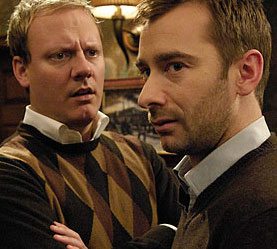Originally published on www.huffingtonpost.co.uk
Recently I received a survey through the post; apparently out of all the people who live in my area I was selected at random despite the fact my partner also received one, what a coincidence. However this isn't what I'm getting at, the survey was about health and wellbeing for 2013 from the NHS, I know it just sounds like so much fun to fill in doesn't it?
Anyway after flicking through the questions there was the usual; do you smoke? Yes, do you drink? Yes, how much fruit and veg do you consume a week? As you can see it was a pretty standard set of questions. Now this is all well and good and maybe just maybe the survey will help with something, I don't know what it'll help with besides helping to waste some more precious NHS money. But as I got to the end of the survey there was the typical 'about you' section, gender, age, ethnicity you get the picture. I assume this is to help them narrow down which age groups, genders and social groups are suffering the most and which ones are experiencing a happier life, but the one question that was missing was that of sexuality.
Now before you start making assumptions that I'm someone who wants to shout from the rooftops that gay people are being ignored again, I'm not, but you can't help but wonder why this option isn't there. I mean study's have found that LGBT people are more likely to suffer from mental health issues or drink and drug abuse, and by asking this question on a more localised survey by the NHS they could find a way of tackling this, instead of leaving it to certain organisations such as Stonewall and the LGF.
Not every area in the country has somewhere that gay people can turn to for help, and some may send this survey back and be found to be severally depressed or unhappy with life who may be gay, yet this will go unnoticed. I filled out an online health and wellbeing survey a while ago specifically for LGBT people, which was put together by an LGBT organisation, just so I could help out with these statistics that so many organisations such as the NHS are missing.
However it isn't just this NHS wellbeing survey that fails to ask this question. When I was at University I applied for a job at a supermarket so I could make some extra money. Me and my friend (who happens to be a lesbian) went to get the application forms and both said there's no point applying, as we wouldn't get the job. However after noticing the equal opportunities section I made a quick joke that this was our way in, however there was once again no section asking about sexuality. I didn't get the job, because I had no experience working in a supermarket and neither would I want to be given a job simply because I am gay. But it makes me wonder how a company can call themselves an equal opportunities employer and only mention disability, race and ethnicity on an application form as if they're the only reasons why people would be discriminated against when applying for a job.
Now I may have digressed into something completely different there but the principal is still the same, does the NHS not care about the well being of LGBT people? Of course they care, but how will they know the full extent of the health and wellbeing of a social group that does suffer abuse in the areas in which they live (do you feel safe in your area was a question on the survey), and are known for having higher abuse rates if they fail to include a small section in a survey?
Maybe they just forgot, maybe they ran out of space on the paper or maybe because there are LGBT groups out there who've conducted these kinds of studies in the past they felt they didn't need to. The thing is we will never know why it wasn't on there, but the other fact is; if they continue to miss this off surveys in the future then the health and wellbeing of a vast amount of LGBT people will continue to go unknown, which could be a big problem for many.



